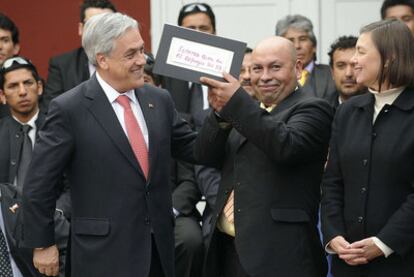Chilean miners face uncertain future
Most of the 33 men from the San José mine disaster are now unemployed
Mario Sepúlveda, better known throughout Chile as Super Mario, has emerged as the spokesman for the 33 miners who spent more than three months trapped 700 meters underground following the collapse of a shaft at the San José mine one year ago. The 40-year-old is a regular on Chilean talk shows, has his own Twitter account, and has just set up a website. He has also hired a manager who arranges media interviews.
His fellow miner Jimmy Sánchez, at just 20, the youngest of the group, has not been so fortunate.
"He was given a clean bill of health by the doctors on December 23, but he's not well," says his mother Norma Lagués. "He has nightmares; he wakes up crying; he has panic attacks in his sleep, and we just don't know what to do. He just wants to find a job ? any job."
It was a year ago last Friday that the disaster occurred at the San José mine near Copiapó in the Atacama desert, located some 800 kilometers north of the Chilean capital of Santiago. The event changed the miners' lives forever: some know how to handle the media for the better, but for most, their circumstances have changed for the worst.
For a few months they were national and international celebrities, receiving invitations to appear on television shows abroad. The media offered them large sums of money to tell their stories. But the offers have now largely dried up and they must face reality.
"The money we saved is drying up fast, and we will have to find a way to make a living," says Ariel Ticona, aged 30.
"They are gradually returning to reality, and in some cases, this is proving to be difficult. Many of them are now facing harder financial difficulties than when they were working in the mine," says André Sougarret, the engineer who directed the rescue operation.
None of the miners has found long-term employment since emerging from their ordeal. Some have preferred to live off the little money they have managed to save, but mostly because they are still suffering the psychological effects. Seven are still unable to return to work for medical reasons.
"My husband is suffering psychologically, and I am too," says Angélica Álvarez, the wife of Edison Peña. "As a result of the fame and the trips abroad, where he was lauded and feted, he has lost his grip on reality. Far from helping him, the whole experience has been terribly damaging because neither he nor the others were prepared for this circus. Life was better for us before August 5, 2010," she says.
Eleven of the miners have managed to make a living so far as advisors, among them Juan Illanes, a 53-year-old former member of the armed forces, who is married and has a 21-year-old son.
Others are getting by more modestly. Osmán Araya, 30, Víctor Zamora, 34, and Darío Segovia, 49, have set themselves up as fruit and vegetable vendors in their local markets.
Yonny Barrios, 52, who suffers from silicosis, was able to set up a corner store in Copiapó, using the 7,500 euros a Chilean entrepreneur gave him as a donation toward the end of last year. Former soccer player Franklin Lobos, 54, now works as the coach of a local youth team.
The miners have filed negligence lawsuits demanding $10 million from the bankrupt mine's owners and $17 million from the government for failing to enforce safety regulations. But, even if they win, it will take years before any settlement is paid out.
They have yet to make any money from the books written about their ordeal, although they are now working with Héctor Tobar, a Los Angeles Times Pulitzer Prize-winning journalist, on a book. Meanwhile, producer Michael Medavoy, who earned an Academy Award nomination last year for putting together Black Swan, has announced that he has purchased the film rights to their story through his Half Circle production company. Oscar-nominated screen writer José Rivera will pen the screenplay.

Delays in payouts
The Chilean state mining company last week finally began to pay some of the redundancy settlements that the San Esteban Mining Company, which owns San José, still owed to the 33 miners, along with 261 employees who lost their jobs when the mine collapsed last year, reported Efe news agency.
Enami, Chile's state mining company, handed over the payments to 145 employees of the mine in Copiapó. The rest of the workforce is due to collect their redundancy settlements from Enami's offices in Santiago in the coming weeks. It should be the last of the payouts.
"If we were rich, we wouldn't have been so keen to get this money," said Jimmy Sánchez, one of the 33 who was trapped underground for 69 days, after picking up his check.
Tu suscripción se está usando en otro dispositivo
¿Quieres añadir otro usuario a tu suscripción?
Si continúas leyendo en este dispositivo, no se podrá leer en el otro.
FlechaTu suscripción se está usando en otro dispositivo y solo puedes acceder a EL PAÍS desde un dispositivo a la vez.
Si quieres compartir tu cuenta, cambia tu suscripción a la modalidad Premium, así podrás añadir otro usuario. Cada uno accederá con su propia cuenta de email, lo que os permitirá personalizar vuestra experiencia en EL PAÍS.
¿Tienes una suscripción de empresa? Accede aquí para contratar más cuentas.
En el caso de no saber quién está usando tu cuenta, te recomendamos cambiar tu contraseña aquí.
Si decides continuar compartiendo tu cuenta, este mensaje se mostrará en tu dispositivo y en el de la otra persona que está usando tu cuenta de forma indefinida, afectando a tu experiencia de lectura. Puedes consultar aquí los términos y condiciones de la suscripción digital.








































